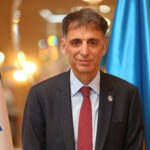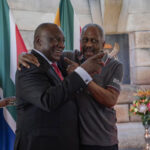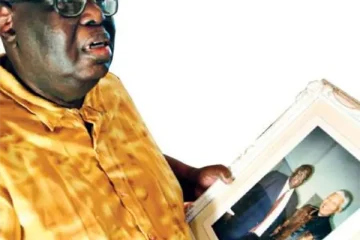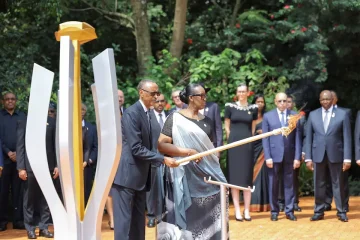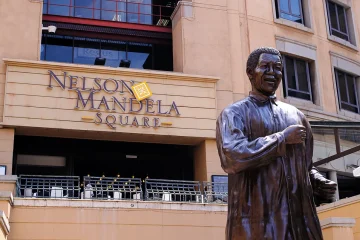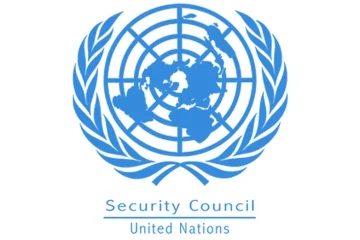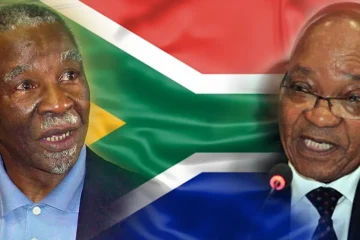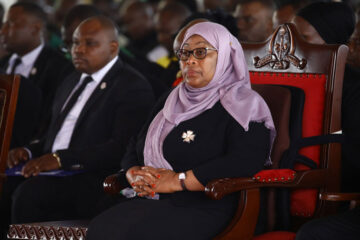[tta_listen_btn listen_text=”Audio” pause_text=”Pause” resume_text=”Resume” replay_text=”Replay”]
I believe that this occasion is indeed unique because I can think of no event that occurred 150 years ago in our country, in 1873, other than the birth of UNISA, which would be celebrated by all the people of South Africa together.
Recently, I came across a Diary entitled ‘What We Did in South Africa in 1873’ by a British citizen, Edmund Byron.
Concerning what brought him to South Africa, Mr Byron wrote:
‘For some time past I had been desirous of making a short excursion into the interior of South Africa, partly with a view of seeing something of the country, but principally for the sake of the excellent sport afforded by the numerous varieties of both large and small game, which are to be found there…’
And so, at last, at the beginning of 1873, Mr Byron and his wife found the opportunity to visit our country.
Below are two of the moments during their visit which Mr Byron put into his Diary. With regard to one of these, he wrote:
“We went to Mowbray to dine and spend the afternoon with the Bleeks. Saw two bushmen there, great curiosities, more like baboons than men; perhaps the connecting link in Darwin’s chain between man and the ape. Dr Bleek had got them, through the government, to assist him in compiling his dictionary of their most extraordinary language.”
He also recalled a moment when they travelled by ox-wagon out of Pietermaritzburg, deeper into Natal. He says after they had hired some ‘Caffres’ to accompany them, “a queer little old fellow…arrived at our camp this morning”.
He then writes of this “queer little old fellow’”:
“He was supposed to be a swell, a near relation of a chief in his own country (district), and a queer piece of royalty he made; as ugly as sin, strongly marked with the small-pox, got up in an extraordinary rig, and withal very comical in appearance. He was told off to fetch water, mind the fire, wash up, and generally assist Kemp, who, unable to master the click in his Kaffir name of Klangilan, turned it into “Slangey”, as short and easy to pronounce. The fellow was a perpetual joke amongst us, but he was no fool, liked all he could get, and was not over fond of work, but a very good nigger on the whole.”
I cite Byron’s 1873 Diary to remind ourselves that even as UNISA was born, most of us then were bushmen, kaffirs and niggers!
Indeed, we have cause to celebrate the UNISA birthday because, to my knowledge, it never excluded from its classrooms any of our citizens, despite the setting in which it was born!
On the very eve of this celebration, a Report on UNISA by a properly appointed Independent Assessor entered the public domain, generating great worries about the future of this university.
In this context, I hope that many of us have read the relatively short article on UNISA by one of our leaders I greatly respect, Dr Mosibudi Mangena, former President of AZAPO and former Minister of Science and Technology.
Among others, this is what Dr Mangena wrote: “Some of us were alarmed and saddened by stories circulating in various media outlets in recent weeks about alleged wrong-doings at the University of South Africa, Unisa… Every patriotic South African should be worried by the apparent decline in the prestige of Unisa, but a collapse should induce earthquakes in our heads…
“Students whose circumstances, including inadequate financial resources, family responsibilities or lack of space at contact universities, have been able to pursue their studies through Unisa.
‘(This includes) ‘many students who were expelled en masse or walked out of universities in 1972 as a result of the student and political activist Onkgopotse Tiro affair at the University of the North (Turfloop), (and) ‘those of us who found ourselves on Robben Island because of our political activism’ (all of whom) studied through Unisa…’
“In addition to being the biggest university of its type on the African continent, it is also headed by an African woman, Professor Puleng LenkaBula, for the first time in its long and distinguished existence…
“UNISA’s size, history, prestige, symbolism, and place in the configuration of tertiary education in this country are such that all patriotic citizens of this country should ensure that Unisa does not only survive but that it goes from strength to strength…
“Considering the special history and status of Unisa, we should all make sure the institution is protected.”
I am very pleased that these wise, moving and timely words by Dr Mosibudi Mangena have found their way into this historic 150th birthday celebration of UNISA.
I believe that as we celebrate this birthday, we must, in particular, reflect on the deep meaning of our motto – “Pro Gentibus Sapientia”, which means “Learning in Service to Humanity”.
Of course, this relates directly to our Vision which is – “Towards the African University in the service of humanity.”
I urge that as we celebrate this 150th anniversary, we, members of the University of South Africa, must commit ourselves to do everything possible to realise the two seminal objectives of being:
• truly an African University; and,
• being in practice an institution in the service of humanity!
With regard to both these, the truth is that we are not quite there but have the will and capacity to achieve these historic objectives.
When I spoke here during my inauguration as Chancellor in 2017, I cited a statement made by the 2015 1st African Higher Education Summit Meeting which said:
“African higher education institutions shall commit themselves to the pursuit of excellence in teaching and learning, research and scholarship, public service and provision of solutions to the development challenges and opportunities facing African people across the Continent.”
This speaks exactly to what will inform UNISA’s endeavours as it advances towards its 200th anniversary.
A happy 150th birthday to UNISA and its family, including its Alumni who are spread across the globe!
- This is an edited version of “The Statement Of The Chancellor Of Unisa, Thabo Mbeki, At The Celebration Of The 150th Anniversary Of The University”




